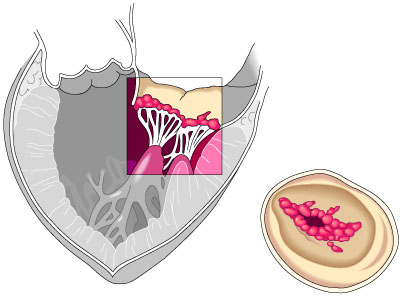Congenital heart disease. Problems with the heart valves may be present from birth. For example, the aortic valve may be almost entirely closed from a very early age. Much more common than this however, are mild abnormalities of the valve, such as being of made of two leaflets instead of three. This so-called "bicuspid aortic valve" is often associated with an accelerated incidence of aortic stenosis that may occur when the patient is in his or her fifties.
Rheumatic heart disease. Some infections with the bacteria called "streptococcus", particularly "strep throat" are followed in several weeks to months by a delayed inflammatory reaction called "rheumatic fever". The delicate valvular structures can be damaged at that time and progressive malformation of the valve can ensue over the next several decades. Valve replacement may be necessary in these later stages. Due to the discovery and use of antibiotics, rheumatic fever is far less common than in the past, particularly in developed countries. Proper treatment of strep infections can prevent almost all of the cases of rheumatic heart disease.

Specific damage from a heart attack. Specific parts of the heart muscle concerned with proper functioning of the valves can be injured in the course of a heart attack. If there is a tear of part or all of one of the "papillary muscles", severe mitral regurgitation can occur rapidly and require emergency therapy, perhaps including surgery.
Weakening of the supporting structures of the heart. In unusual cases, there may be a tear in one of the parts of the mitral valve which attach the valve to its papillary muscle. A rupture of some of the "chordae tendiniae" can cause substantial leakage through the mitral valve. This may begin and progress slowly, or be quite severe at the onset and require emergency surgery. Weakening of the walls of the aorta can occur, which leads to gradual dilation of the aorta, which can then lead to substantial leakage through the aortic valve.
Weakening of the heart muscle. When the heart muscle weakens, regardless of cause, it will tend to lengthen. As the chamber enlarges, so too do the holes which the Mitral and Tricuspid valves are designed to cover. At some point, while the valve itself is not diseased, it simply cannot cover this area, and valvular regurgitation will begin to occur. This often leads to yet further dilation and enlargement of the ventricles, and a "vicious cycle" begins to occur. When this is the cause of the leakage, surgery on the valve alone is often not helpful, since the primary problem was the diseased heart muscle in the first place.
Infections. Infection of a heart valve is termed "endocarditis". This is not a common problem, but it can cause rapid progression of valvular disease, generally regurgitation, over a matter of days to weeks. This infection requires prompt diagnosis and treatment, but may still land up requiring valve surgery even when caught early.
Other causes. There are other even less common causes of valve disease (are you surprised?) which are not discussed here.
No comments:
Post a Comment